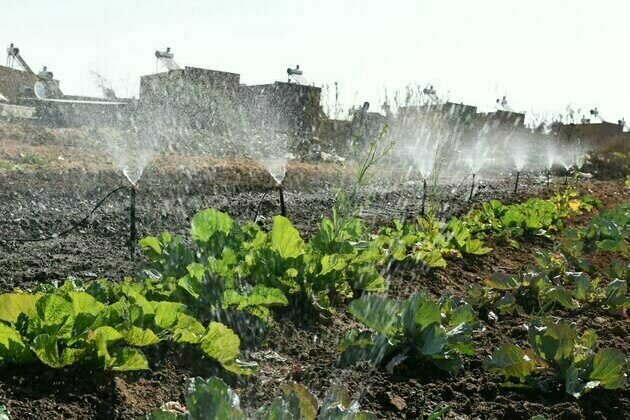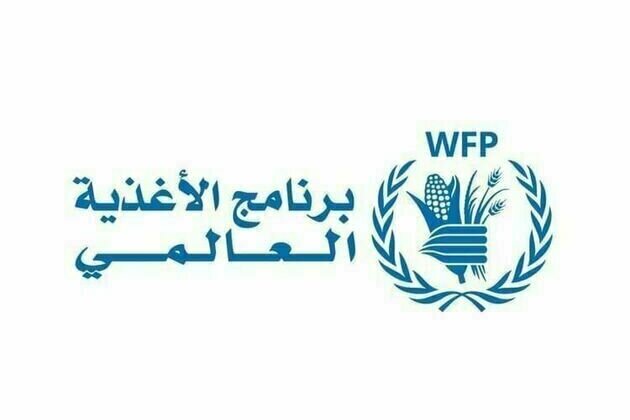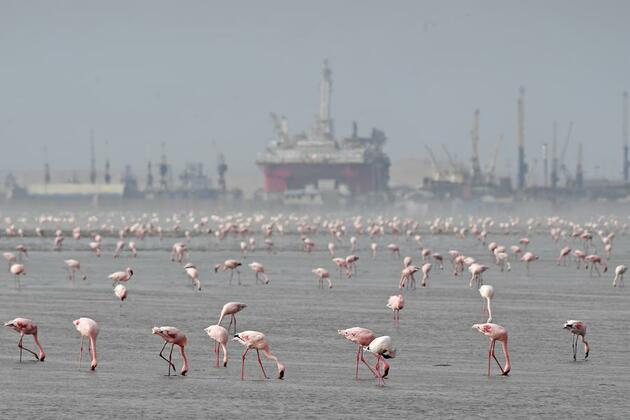Decades of South African research reveal key strategies to reduce water contamination in fruit and veg
The Conversation
01 Jul 2025, 14:10 GMT+10

Water is essential at all stages of food production, from irrigation to food processing to washing fruit and vegetables before we eat them. Crops and livestock need it to grow, but water can also be contaminated by pathogens (any organism that causes disease), heavy metals, and chemicals.
These can be considered a potential food safety hazard when they enter the food chain. For example, contaminated irrigation water can transfer pathogens like Escherichia coli to fruit and vegetables. Eating these raw and without washing them properly can lead to severe stomach cramps, diarrhoea, nausea and fever.
We are a team of researchers from the University of Pretoria and the Water Research Commission in South Africa who have investigated bacterial pathogens in water sources for the past 20 years. We've developed ways to help determine whether water is of good quality when used before and after harvesting fresh produce.
With about 40 years of combined experience, we are also identifying potential hotspot environments for contamination. We're currently tracking multi-drug resistant bacteria in South Africa's water and assessing the implications for food safety. We have also analysed the complete supply chains of fresh produce using microbiological methods to investigate what contaminants might be circulating in vegetable production and contaminated irrigation water.
Read more: What led to world's worst listeriosis outbreak in South Africa
Our research is focused on ensuring that the food reaching consumers' tables does not pose hidden health risks. Over the years, we've learnt these key lessons:
Harvesting rainwater from roofs is a good idea in water-scarce rural South Africa. However, if tanks aren't cleaned regularly, this water can be contaminated by microbes (microscopic organisms that cause disease). The slimy layer building up in water holding containers can provide a favourable environment to enable microorganisms to survive and multiply, including potential pathogenic ones that can affect human health.
Surface water sources, such as rivers and dams, often contain high levels of E.coli and multidrug-resistant bacteria. These can be transferred onto vegetables during irrigation. This creates a potential health risk for anyone eating the vegetables without proper washing with safe water.
South Africa's current water quality guidelines have not been developed to test for contamination by multidrug-resistant bacteria and emerging pathogens. They mainly focus on indicator organisms such as E. coli typically associated with faeces.
To address these problems, farmers, academic researchers and the government must collaborate to develop new water quality standards. These must reflect local conditions and emerging threats. This is crucial for protecting the food system and to ensure that our food is safe.
It starts at upstream activities such as waste water from non-functional municipal sewage systems contaminating water. Such water can affect downstream farming when used for irrigation. Pathogens can attach to plants and survive and cause build up over the season to levels that can cause a concern at farm level. Small-scale farmers, who supply much of the fresh produce in informal markets, face major problems in accessing clean irrigation water.
Even if water looks clean, it can contain hidden contaminants that compromise food safety. Safe water, tested and treated to remove such hazards, is essential to prevent this. In reality, however, surface water sources (rivers, lakes, ponds) are often the only available water for crop irrigation, livestock production and domestic use. But in many areas, these water sources have been contaminated by partially treated or raw sewage that's been released into the environment.
Our research has found that smallholder farmers' irrigation water has transferred Salmonella and E.coli to soil and fresh produce.
Things can also go wrong at retail level. Once fruit and vegetables reaches informal markets, its safety can vary widely depending on the vendor and the practices being followed, such as putting spinach in dirty water to keep it fresh looking and prevent it from wilting. Research has also found the presence of bacterial pathogens with expanded antimicrobial resistance profiles on fresh produce at the point of sale. Further, that multidrug-resistant potentially pathogenic bacteria were present throughout spinach production, even on commercial farms where similar contaminated irrigation water was being used.
There are also threats at home. Roof-harvested rainwater contained E. coli and Enterococcus, which can transfer to vegetables watered from the tank.
Our research highlights the pressing need for more real-time data and context-specific water quality guidelines. These need to go beyond indicating E.coli levels, to also identifying other potential threats such as Salmonella and clusters of E. coli that produce Shiga-toxins. These can cause severe illnesses such as hemorrhagic colitis and hemolytic uremic syndrome, where blood clots damage the kidneys, potentially leading to kidney failure.
We are currently tracking antibiotic resistance in rivers. Our aim is to turn this research into practical actions for safer irrigation, better hygiene, and reduced antibiotic resistance. This will help protect South Africa against food safety hazards.
In areas that are known to have poor water quality, continuous surveillance and testing must be set up. Without this surveillance, contamination could go unnoticed, potentially affecting consumers. Food also needs to be monitored and samples taken to see if it's free of these pathogens.
Read more: Water quality in South Africa: reports show what needs to be fixed, and at what cost
Water is essential to all life. Ensuring its safety requires strong collaboration between government, scientists, farmers, and communities.
Overall, South Africa needs a comprehensive food safety policy and to be involved in implementing a continental food safety agency and framework for more aligned regulation and control.
The team currently leading the research are Professor Lise Korsten and Dr Loandi Richter-Mouton (University of Pretoria) and Dr Eunice Ubomba-Jaswa and Dr Samkelisiwe Hlophe-Ginindza (Water Research Commission).
 Share
Share
 Tweet
Tweet
 Share
Share
 Flip
Flip
 Email
Email
Watch latest videos
Subscribe and Follow
Get a daily dose of Madagascar Sun news through our daily email, its complimentary and keeps you fully up to date with world and business news as well.
News RELEASES
Publish news of your business, community or sports group, personnel appointments, major event and more by submitting a news release to Madagascar Sun.
More InformationAfrica
SectionSouth Africa seeks extension of US tariff hike deadline
Pretoria says it is negotiating for a maximum tariff rate of 10% from Washington as a worst-case scenario ...
Smriti Mandhana moves to third spot in ICC T20I batter rankings
New Delhi [India] July 1 (ANI): India star opening batter Smriti Mandhana has reaped a reward for her recent century against England...
Refugees escaping Sudan face escalating hunger, malnutrition as food aid risks major reductions
GENEVA, 1st July 2025 (WAM) -- The United Nations World Food Programme (WFP) warned that millions of Sudanese refugees who have fled...
New road will remain as symbol of India-Guyana "deep friendship": Jaishankar as Phase I of Ogle to Eccles portion of the East Coast-East Bank road linkage project is commissioned
Georgetown [Guyana], July 1 (ANI): As Guyana President Irfaan Ali commissioned Phase I of the Ogle to Eccles portion of the East Coast-East...
Russia eyes Africa as major coal export market
The continent could become one of the top three destinations for the resources, a Russian Energy Ministry official has said ...
Namibia ships first export consignment under AfCFTA framework
Namibia has officially launched its inaugural export consignment under the African Continental Free Trade Area (AfCFTA) framework....
International
SectionBeijing crowds cheer AI-powered robots over real soccer players
BEIJING, China: China's national soccer team may struggle to stir excitement, but its humanoid robots are drawing cheers — and not...
COVID-19 source still unknown, says WHO panel
]LONDON, U.K.: A World Health Organization (WHO) expert group investigating the origins of the COVID-19 pandemic released its final...
Fox faces $787 million lawsuit from Newsom over Trump phone call
DOVER, Delaware: California Governor Gavin Newsom has taken legal aim at Fox News, accusing the network of deliberately distorting...
DeepSeek faces app store ban in Germany over data transfer fears
FRANKFURT, Germany: Germany has become the latest country to challenge Chinese AI firm DeepSeek over its data practices, as pressure...
Canadian option offered to Harvard graduates facing US visa issues
TORONTO, Canada: Harvard University and the University of Toronto have created a backup plan to ensure Harvard graduate students continue...
Israel should act fast on new peace deals, Netanyahu says
JERUSALEM, Israel: Israeli Prime Minister Benjamin Netanyahu says that Israel's success in the war with Iran could open the door to...













